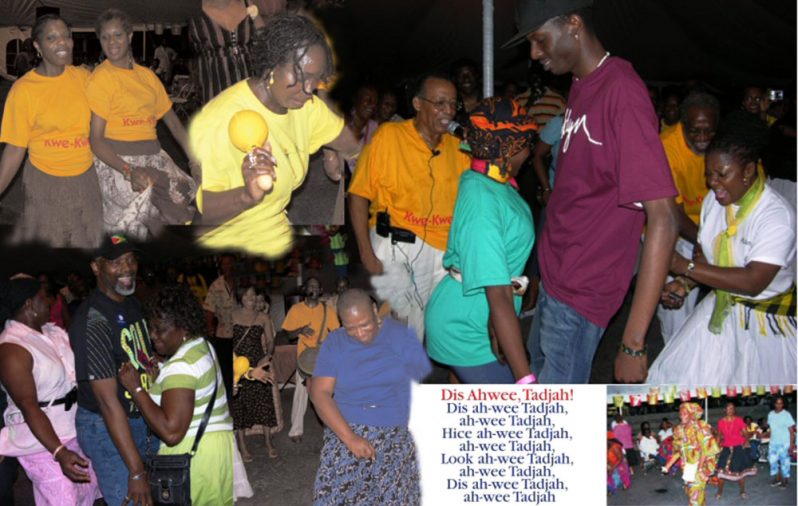By Shauna Jemmott
“IT’S different; it has been distorted!” That’s the verdict of Sister Clementine Marshall of the African Cultural and Development Association (ACDA) on the subject of modern-day ‘Queh-Queh, the Afro-Guyanese version of wedding-eve celebrations.Queh-Queh, also known as locally as ‘Ca-cah-lay’, is the most exciting ceremonial event before the wedding. It is a time of celebration with music and gyration just hours away from the coming together of two families through marriage of their daughter and son. It is a ritual of song and dance that is performed on the eve of the wedding, and was exported from the Namibian tribes in south-west Africa by Africans who came to Guyana during the trans-atlantic slave trade.
But according to Sister Marshall, who is often called upon to take charge of several ‘Queh-Queh’ festivities, the value of the ‘Queh-Queh’ is on the verge of being lost, in that the ceremony in which children were once kept at bay now involves them in lawlessness.
‘ADULT THING’
“In the past, persons would ask me to go to a wedding and to carry on a ‘Queh-Queh’,” Sister Marshall said, adding:
“In the first place, ‘Queh-Queh’ is an adult thing; it’s not for children. So when you go to ‘Queh-Queh’ and you see little eight-year-olds and 10-year-olds talking about ‘Ah woman in front and a man behind’, I hate it!”
Whenever such things happen, Sister Marshall said, she would register her disapproval by either refusing to participate in the ceremony, or just walk out.
Many people, she said, do not understand the purpose of the pre-marriage ceremony.
As she painstakingly explained, “Queh-Queh is supposed to be our ancestors’ way of telling a young woman if she’s gonna to get married, she’s gotta know about sex.
“So they’re telling her, in the Creolese way, ‘This is how to treat a man; you must wash yuh husband clothes.’”
What it essentially is, she further explained, is a forum at which to offer advice, especially to the young woman preparing for life after the wedding ceremony.
“Yes, there is a satiric way about the thing… but it’s just advice; that is the way they gave advice to a young woman when she’s gonna get married,” Sister Marshall said. “So it’s not supposed to be a place where little children are.”
VERY SUGGESTIVE
‘Queh-Queh’ songs are very suggestive, and in many of the celebrations in recent times, obscene language and vulgarity have been introduced, distorting its true purpose.
African drums, chants of folk songs, and an exciting ring dance joyfully bond families and supporters in giving the couple a grand send-off, but Sister Marshall said many times she’s turned up at events and is not familiar with many of the songs anymore.
“The ‘Queh-Queh’ is supposed to introduce the boy to the girl’s family, and then he has to search for his bride; buy his bride to show that she has value,” she said.
Comparing the songs long ago to those of today, Sister Marshall said:
“First, they used to sing things like ‘Nabah Virgie son’, but now it’s ‘Ah woman in jail’. Where on EARTH did that come from! It’s so distasteful!”
DOWNRIGHT DISRESPECTFUL
The composition these days is completely vulgar, and features messages that are purely disrespectful to women, often using colours to describe the state of their ‘privates’.
“I hate it! I hate it! As soon as I see somebody raise it, I either sit down or I leave,” Sister Marshall said, adding:
“But then again, they have women who participate in those things and never object to the things they are singing.
“The whole moral is just gone, so we’re hoping that young people, especially young girls, would understand how precious they are until they get married.”
Some of the traditional ‘Queh-Queh’ folk songs are: Goo’night aye, goo’night o; Missy laas she gol’ ring; Hear Auntie Bess; Cuma- cuma fish; Uncle Joe; Sitira gal; Tung na mah; Run about on Sunday School; Oh gal, ah too love yuh; Ting na regulah; Itanamee; Janie gyal; De watah coal; See me li’l brown boy; and Las’ night, ah was drunk.
According to Online sources, the lyrics of ‘Missy lost she gold ring’ follow the traditional pattern of Queh-Queh, involving searches and innuendos, as ‘Missy’, representative of a dislocated and mentally denuded people, continues her search for a long-lost identity, philosophy and spirituality in order to complete the ancient circle of life through the marriage of her body and soul.




.png)









